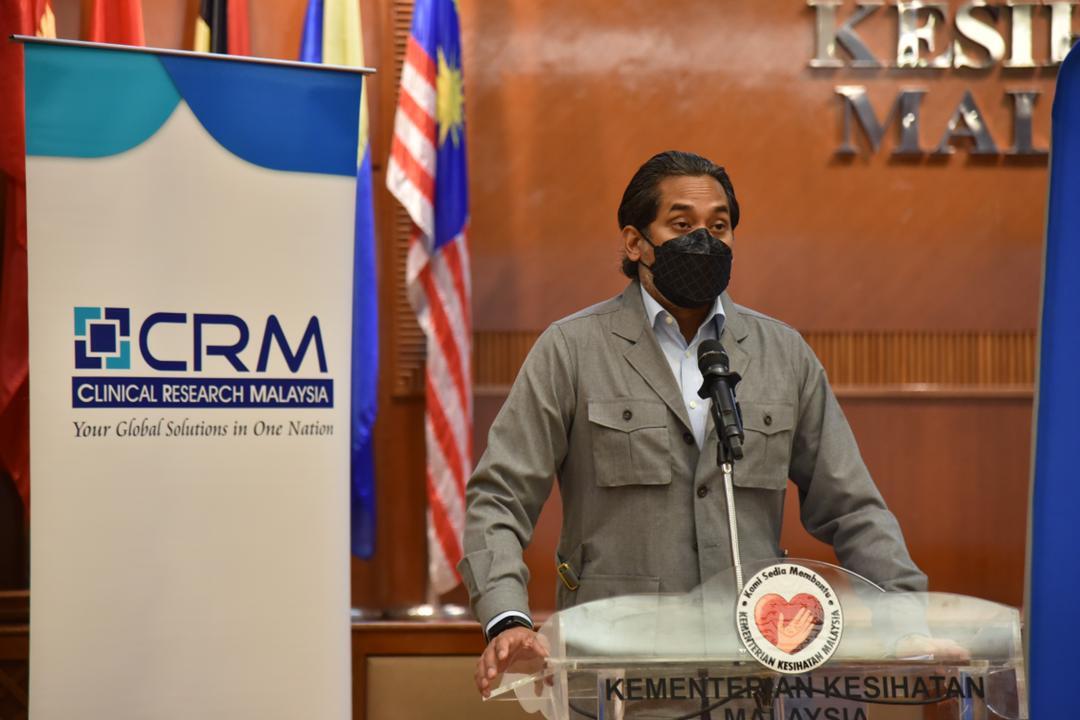KUALA LUMPUR, Mar 21 – Malaysia conducted 215 clinical studies in 2021, the highest recorded to date, putting the country in second place in terms of number of global industry sponsored research in Southeast Asia after Singapore.
Health Minister Khairy Jamaluddin said Malaysia conducted a total 1,806 sponsored clinical research between 2012 and 2021, with over RM834 million gross national income (GNI) generated.
Last year, infectious diseases topped new sponsored clinical research in Malaysia with 40 studies, reversing the trend since 2012 when oncology comprised the majority of studies, involving novel therapies. Oncology came in second in 2021 with 33 new studies.
The highest value contracted last year was worth RM226 million.
“I would like to congratulate CRM on the initiatives undertaken to facilitate the growth of sponsored clinical research in Malaysia and look forward to more excellent achievements in the future,” Khairy said during the launch of the Clinical Research Malaysia (CRM) Annual Report 2021 and Phase 1 Realisation Project (P1RP) Report in Putrajaya today.
Sponsored clinical studies are usually funded by pharmaceutical companies to conduct clinical trials that involve a research treatment or therapy.
In Malaysia, sponsored research has been conducted in 220 clinical study sites since 2012, involving Ministry of Health (MOH) facilities, university hospitals, and private medical centres. Nearly half of the sponsored research studies are conducted in MOH facilities, mainly consisting of public hospitals and primary health care centres.
The top five sites in 2021 were University Malaya Medical Centre (UMMC) with 48 studies, Pulau Pinang Hospital (24 studies), Kuala Lumpur Hospital (HKL) (21 studies), Sarawak General Hospital (SGH) (17 studies), and Ampang Hospital (17 studies).
The top five study sites for infectious diseases in 2021 were UMMC with 9 studies, Miri Hospital (8 studies), Seberang Jaya Hospital (5 studies), Sunway Velocity Medical Centre (4 studies), and Raja Perempuan Zainab II Hospital (4 studies).
For oncology, the top five study sites were UMMC with 18 studies, HKL (12 studies), Pulau Pinang Hospital (11 studies), National Cancer Institute (8 studies), and Beacon Hospital (8 studies).
Khairy pointed to a decreasing trend in bioequivalence studies versus other interventional studies over the past nine years, suggesting that Malaysia is becoming a preferred site for many new innovative therapies and new drug studies.
A bioequivalence study is often done for generic drugs or when a formulation of a drug is changed during development. It is a type of study where two drugs or two sets of formulation of the same drug are compared to show that they have nearly equal bioavailability and pharmacokinetics and pharmacodynamics (PK/PD) parameters.
Interventional study is a type of clinical study in which participants are assigned to groups that receive one or more intervention or treatment (or no intervention) so that researchers can evaluate the effects of the interventions on biomedical or health-related outcomes.
On the unveiling of the P1RP Report, Khairy said P1RP was developed by CRM in 2016 to ensure Malaysia’s readiness for safe and quality conduct of early phase trials, especially first-in-human (FIH) trials.
Many of the nation’s firsts were accomplished from the project, including the setup of Phase 1 guidelines, establishment of a Phase 1 accredited facility in SGH, and the conduct of a First-in-Patient study in 2021.
CRM also sponsored the training and development of three National Pharmaceutical Regulatory Authority (NPRA) officers, as well as Dr Voon Pei Jye, a medical oncologist from SGH, in their completion of postgraduate studies and fellowship, respectively, centred in early phase research.
NPRA has now expanded its scope to also accept applications involving locally developed Covid-19 vaccines, in comparison to its prior requirement of accepting only New Chemical Entity (NCE) and herbal products.
This is in line with the National Vaccine Development Roadmap which aims for Malaysia to develop its capabilities in vaccine development and production, Khairy said.
With the conclusion of P1RP in 2021, CRM has further supported the enhancement of FIH capabilities and capacities in Malaysia by delivering on the needed framework, trained regulators, equipped study site, and experienced study team in place.
Since its establishment in 2012, CRM has engaged with close to 300 sponsor companies including biopharmaceutical, biotech, and medical device companies, and over 70 contract research organisations.
CRM currently has over 150 trained study coordinators placed throughout Malaysia, mainly in MOH study sites, to support investigators with the conduct of clinical research. In 2021, CRM introduced two new services — clinical trial advertisement service and study drug disposal service — to further provide the needed end-to-end support to its clients.








